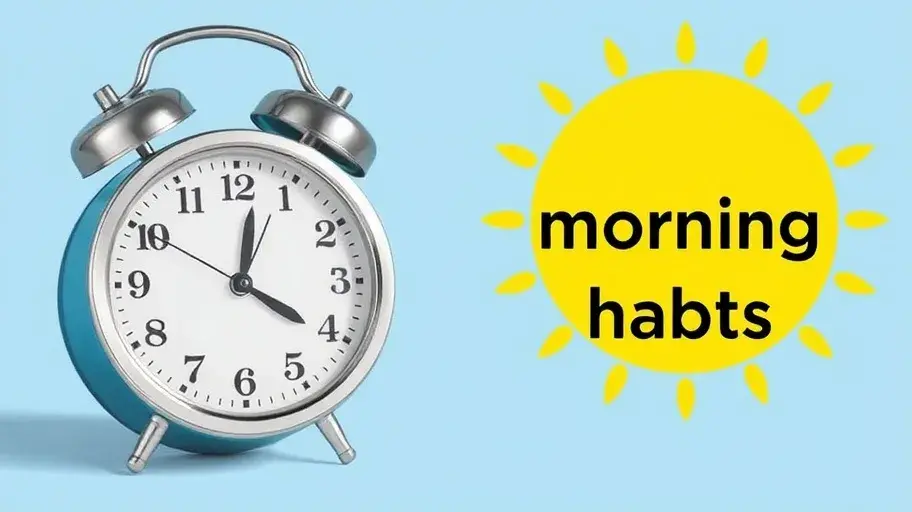I will keep this casual. No preachy tone, no miraculous promises. Just small things you can try tomorrow, and the next day, and maybe keep doing when they feel useful. I’ll explain why each habit matters and how to actually make it happen, without turning your morning into a checklist you hate.
Drink a glass of water first thing
You slept for several hours without sipping a drop. A glass of water is an easy first move. It’s not dramatic, it’s practical. It clears a little of the post-sleep fog and gives your brain a quiet nudge: morning has started. I usually keep a glass on the nightstand so I don’t have to think about it. Room temperature water is less shocking than cold, but whatever you’ll do consistently is best.
Move for five to ten minutes
This is not a workout requirement. It’s a way to wake up the body, loosen stiff joints, and change your mood. Walk to the mailbox, do a few shoulder rolls, touch your toes, or march in place while the kettle boils. If you can manage ten minutes, great. If you can only squeeze five, do those five with intention. Think of it like oiling a squeaky hinge, a small push now that keeps the door from jamming later. Many people find short morning movement reduces grogginess and helps focus, similar to the way of protecting your focus during the day.
Make your bed
This is a tiny thing with immediate feedback: you can see the result. That matters. Straightening sheets takes thirty seconds and gives your morning a visible win. It doesn’t fix big problems, but it makes the room look less chaotic and sometimes that calm spreads into other choices. If the idea sounds silly try it for a week and notice whether other small tasks feel easier afterward. Some people link this habit to better productivity but that probably depends on personality and context.
Get natural light
Sunlight tells your brain what time it is. Five minutes at a sunny window or a brief step outside sets your internal clock and helps align sleep and wake hormones. If you live somewhere cloudy long-term, a light therapy lamp can help but it is not the same as real daylight. The simplest move is to expose your face to daylight soon after waking sit by a window, stand on the balcony, or take the trash out. It’s a small, honest signal to your body that the day has begun.
Pick one meaningful task for the morning
Before you open email or social feeds choose one thing that, if done, would make your morning feel successful. Not a list of ten things. One thing. That’s the same idea I explained on to-do list and how it works article. It could be drafting a paragraph, making a phone call, packing a lunch, or writing one clear sentence about a project. Focusing on a single target shrinks the day’s mental clutter and makes momentum more likely. Finishing a real task feels better than checking off tiny, forgettable items.
Journal for five minutes
Set a timer, write for five minutes. You don’t need flair. Try three prompts: what you will do today, one worry you can set aside for now, and one small thing you’re grateful for. That quick externalization moves thoughts out of your head so they stop looping, Writing things down has a power apps can’t replace. If you prefer a voice memo or a rough sketch, do that. The point is to clear the static so your mind can work on actual problems instead of rehearsing everything.
Delay the phone
Starting the day with notifications hands your best thinking time to other people. Keep your phone out of reach or on Do Not Disturb for at least thirty minutes. If that feels impossible, try fifteen minutes. The idea is to protect a short window where you set the day’s tone instead of reacting to it. This is probably the toughest change for most people, but it’s also one of the highest payoff moves.
Eat something
Breakfast doesn’t need to be elaborate. A bowl of yogurt with fruit, eggs and a piece of toast, or nut butter on bread will steady your energy better than coffee alone. If you hate breakfast, a banana and a handful of nuts will do. The goal is to avoid a blood-sugar crash that makes decisions harder later. If you drink coffee, pair it with some protein or fiber so the buzz doesn’t turn into a jittery decision fog.
Do a short centering practice
You don’t need to sit still for an hour. Three to five minutes of focused breathing, a quick body scan, or repeating a grounding sentence will do the job. Try this: inhale for four counts, hold two, exhale for six, repeat five times. Its fast and portable and it changes your nervous system enough to make the rest of the morning calmer.
Prepare one thing the night before
Pick one concrete prep step to do before bed. Lay out clothes, set a water bottle on the counter, pack your bag, or choose the book you’ll read in the morning. Doing one small thing removes friction and drops the chance of that low-level panic about where keys are or what to wear. Consistency beats perfection here; one small prep step every night will save time and energy.
How to try these without overload
Start realistic. Don’t try to adopt all ten at once. Pick one or two that actually fit your life and do them three mornings in a row. If they stick, add one more. Habit building is boring and that’s the point. Choose things you won’t dread.
If you want one tiny starter pack try this for a week:
- drink a glass of water, move for five minutes, and keep your phone in another room.
Those three moves together create space, momentum, and focus. They’re simple enough to stick with and meaningful enough to notice.
What to watch out for
Don’t copy dramatic morning routines you see online, same goes for productivity hacks like multitasking. because they looked impressive on video. Cold showers and dawn workouts work if you genuinely enjoy them. If a habit feels like armor you must put on then it probably won’t last. Also, don’t treat a missed morning as a moral failure. Bad mornings happen, that’s life. Use these habits as flexible tools not rules.
Note about measurable results
Track lightly if you like data. Write down which habits you tried each morning for a week, not to punish yourself but to notice patterns. Maybe the days you moved were the days you felt less tired by afternoon, or the mornings you delayed your phone you actually finished that one task. Use that feedback to keep two or three habits that work for you. If tracking sounds boring skip it. You don’t need a spreadsheet to live better.
Small changes, steady days
These habits aren’t magic. They’re small adjustments that tilt the odds toward a smoother day. The idea is to make early choices that reduce friction, preserve mental space, and give you a few quick wins. Over time those tiny wins accumulate into steadier days, not flashy transformations but practical, usable improvements.
Practical trick that actually help
Keep a glass or bottle of water where you can reach it easily. Put the clothes you might wear next to the bed. Set a single timer for five minutes for journaling. Remove barriers so the habit doesn’t demand extra thought. The less thinking you need to do about logistics, the more likely you are to follow through.
Final thought
Try one small thing tomorrow. See how you feel. If it helps keep it, if it doesn’t tweak it. Treat the whole process like an experiment, not a test. Be kind to yourself when mornings go sideways. They will, often. That’s normal. The goal is not perfection, it’s a little more ease in the day.




